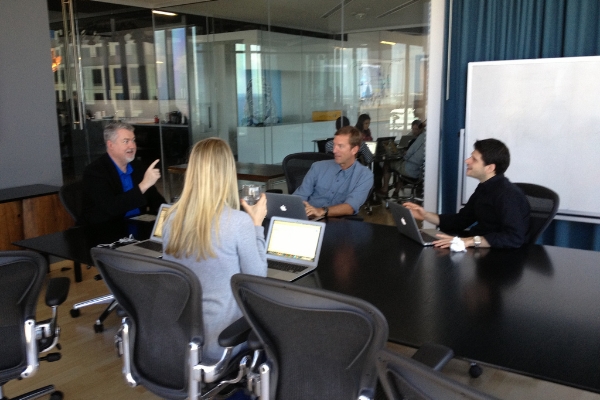
11 Nov Etiquette Rules For Business Meetings
Business meetings are part of every professional’s life, but that doesn’t mean that every meeting (or every attendee) is professional. These meetings can be full of irksome habits and irritating behavior, but they don’t have to be. By following these meeting etiquette tips, professionals can advance their careers and stay on everyone’s good side.
Be Punctual

Mingle and Mix Before the Meeting Starts
Now that everyone has learned the importance of being on time, they may have a minute or two before the meeting begins. It’s important to use that time wisely. Learn about colleagues’ projects, or take the time to become acquainted with guests and perform introductions. The most important takeaway here is to socialize before the meeting starts.
Be Concise
Most people have been stuck in meetings where a speaker just won’t get to the point, and no one wants to be that person. Therefore, when asking a question or making a statement, it’s important to be as succinct as possible. Follow these tips:
- Don’t be repetitive. Many people don’t notice when they do this, and looking for warning phrases such as “as previously stated” may help. If an attendee finds themselves saying such things, they’re likely being repetitive.
- Only disclose as much information as is necessary to make the point. In most cases, those in attendance don’t need to know the entire story; they only need to know about the problem and its resolution.
Brevity is the engine that powers business interactions, and with these tips, meeting attendees can keep discussions on track.
Stand Up When Introduced
Those who are on their feet get noticed sooner. If one is sitting when a visitor walks in, or if they’re a new guest, they should stand when introductions are made. Politeness is important, but it goes deeper than that; standing helps one establish a professional presence and become more respected and valued in the workplace.
Set an Agenda
This etiquette tip is primarily aimed at business meeting organizers, but other attendees should decide what they’ll contribute as well. If one is leading a meeting, a well-crafted agenda will keep others on track, help them know what to get ready for, and identify items to be discussed later. Ideally, agendas should be shared before meetings, so everyone can prepare themselves, ask questions, and raise concerns.
Put Devices Away
Before a meeting starts, be sure to put phones, tablets, and laptops away. Most attendees have work to get back to as soon as the meeting is over, and multitasking during discussions isn’t always the best thing to do. It’s a good idea to put one’s phone on vibrate or silence it entirely, and if it’s necessary to take a call, step outside to do so.
Ask Questions Wisely
If possible, attendees should come to meetings with a list of questions to be asked when a relevant topic is raised. By asking questions at the right time, one can keep a meeting moving efficiently. When a person is in charge of a business meeting, they should solicit questions and input from the group at the close of each discussion. This strategy keeps things flowing smoothly, and it tells others when the topic is about to change.
Don’t Eat, or do It Carefully
Unless the meeting is held over lunch or dinner, it’s best to avoid eating. Opening food packages and clinking utensils can be quite distracting, and if a meeting is scheduled right before mealtime, no one wants to be reminded of how hungry they are. Therefore, attendees should save their snacks for before (or after) the meeting. In the case of meetings held over meals, attendees should practice their best table manners.
In Conclusion
While the etiquette tips mentioned in this guide apply to everyone, they’re typically most valuable when they are shared with other professionals. In every office, there are a few people who may be guilty of at least one or two things on this list. By sharing these easy tips, it’s possible to make business meetings better and more productive for everyone in attendance.


Sorry, the comment form is closed at this time.